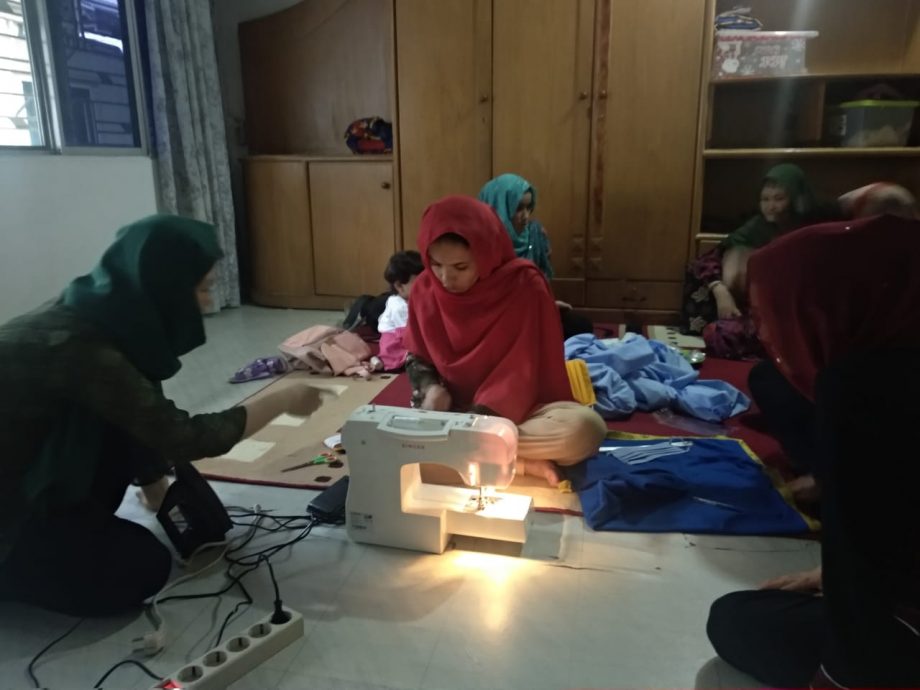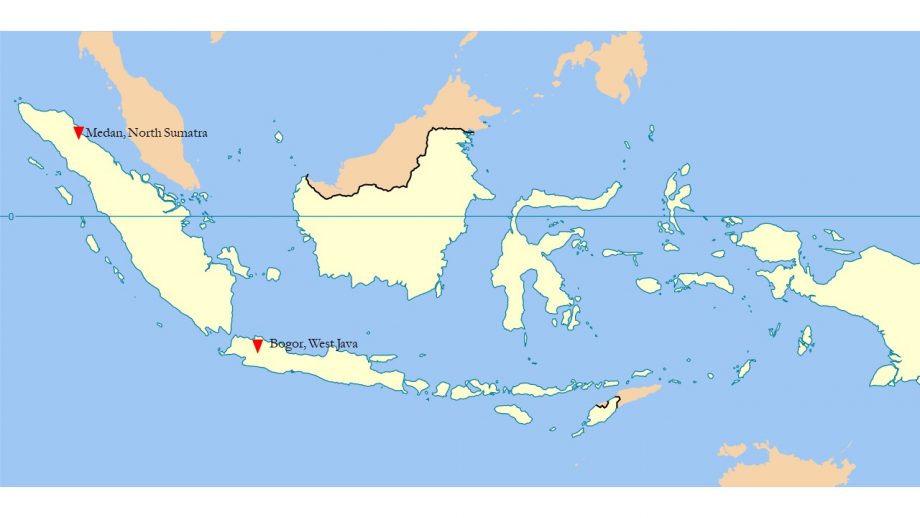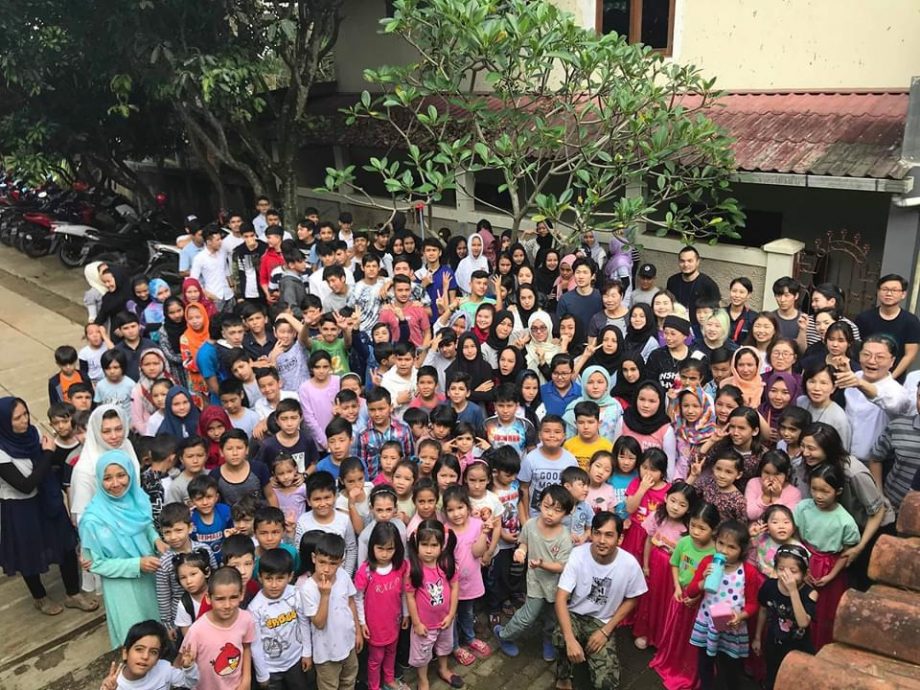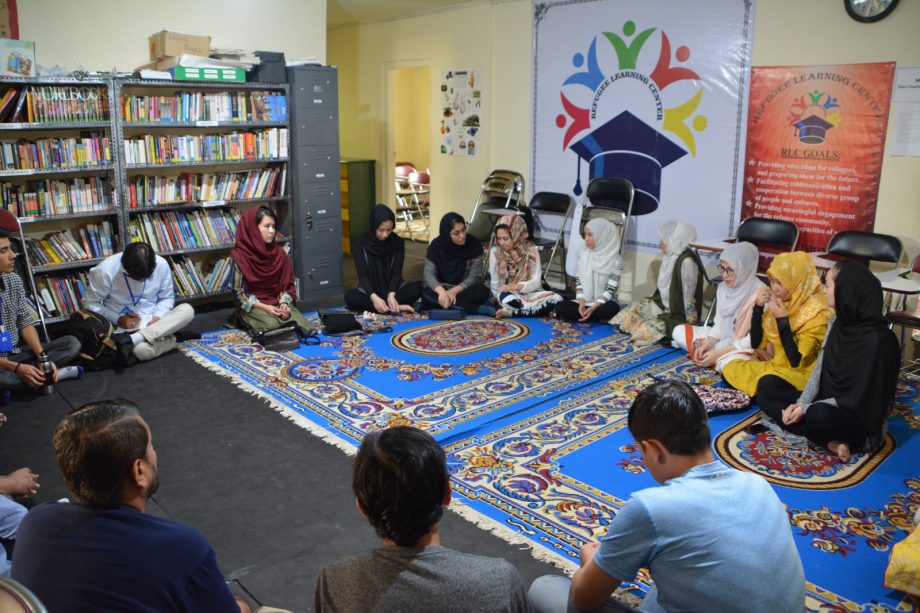“We Cannot Afford to Take Any Risks”
Refugees in Indonesia under Self-Isolation amidst COVID-19 Pandemic

Refugees in Medan making facemasks for an initiative led by a local non-profit organization that covers the costs of their accommodations. Copyright: Muhammad Juma. Published with permission
Refugees in Indonesia are stuck in “troubled transit” (Missbach 2015), hoping for resettlement, living in a constant state of uncertainty. Their ‘refugee’ identities are defined by their past traumas and search for a future home. In their present state of indefinite ‘transit’ in Indonesia, they try to adapt by developing a sense of community, setting up learning centers, and arranging activities such as football games or outings with friends as a way to manage the overwhelming abundance of time and cope with the uncertainty of being ‘stuck.’ However, as the COVID-19 pandemic forces most people, including refugees, indoors, these activities are put to a halt. Uncertainty piled upon uncertainty, the question of what to do with time comes crushing back in.
Refugees and ‘asylum seekers’ are extremely vulnerable to the COVID-19 outbreak (Betscher 2020), [1] as most live in overcrowded camps with poor hygiene and sanitary facilities and severely limited access to medical facilities across Africa, Asia, and the Middle-East (Beech & Hubbard 2020). Like many of the world’s underprivileged, most are unable to practice social distancing nor ensure regular washing of hands. 80% of refugees and asylum seekers in the world live in low to middle-income countries, most of which have insufficient resources to deal with an outbreak of this magnitude. Moreover, refugees and asylum seekers are often excluded from many countries’ pandemic plans (Ravi 2020). In March 2020, the office of the United Nations High Commissioner for Refugees (UNHCR) appealed for a budget of USD 255 million to support the world’s population of forcibly displaced people, characterizing their experience of the pandemic as an “emergency on top of an emergency” (UNHCR 2020). The devastating potential that a COVID-19 outbreak may have in refugee camps and accommodations remains to be a cause for serious concern.
Refugees in Indonesia
In Indonesia, approximately 14,000 refugees are stuck in a limbo of indefinite ‘transit.’ These refugees are registered by the UNHCR Indonesia, waiting for pending resettlement. Indonesia, not a signatory party to the 1951 Refugee Convention and its 1967 Protocol, considers itself a transit country. This allows refugees ‘temporary’ stay until they get resettled to a third country or voluntarily repatriate to their countries of origin. Indonesia does not offer any legal means by which refugees can permanently stay and integrate into Indonesian society (Sadjad & Walden 2019). Most refugees, the majority of which are Hazara refugees from Afghanistan, came to Indonesia with hopes to be resettled to Australia. However, as Australia enacted its Operation Sovereign Borders in 2013 and no longer received refugees registered in Indonesia after 1 July 2014 (Brown & Missbach 2016), refugees had to wait longer periods before they could get resettled to other countries such as Canada, New Zealand, and USA – if they could get resettled at all.
Based on their living arrangements, refugees in Indonesia can be categorized into three groups.[2] The largest group, which consists of about two-thirds of the refugee population in Indonesia, are currently accommodated by the International Organization for Migration (IOM). They live in dorms or lodgings that have been rented by the IOM in cities such as Jakarta, Makassar, Medan, and Batam. The second group, of about 5000 refugees, are often unofficially referred to in Indonesia as ‘independent’ refugees (pengungsi mandiri), as they live without formal support from any institution. They live precariously from their own savings, supported by family members abroad, or by engaging in informal labor – a significant risk as refugees are legally prohibited from working in Indonesia. Most rented houses or apartments located in Jakarta and surrounding cities, such as Depok and Bogor. As refugees’ stay has become increasingly unpredictable, many ‘independent’ refugees have run out of money. This challenge was further exacerbated in March 2018, when IOM stopped listing more refugees onto its existing caseload. As a result, a third group emerged (Missbach 2018). Hundreds of refugees, if not more, have become homeless and increasingly reliant on the unsustainable generosity of local non-profit organizations and philanthropic endeavors. Due to these different living situations, refugees in Indonesia have different experiences and access to support in dealing with the COVID-19 pandemic.
Juma, Sikandar, and Raheema: Refugees stuck indoors in Indonesia

Medan and Bogor, two cities, among others, hosting refugees in Indonesia. Source: Wikimedia Commons, modified to show locations.
Juma, a Hazara refugee from Afghanistan living in an IOM-funded accommodation in Medan, North Sumatra, shared his experience with me over the phone (26 March 2020).[3] Having lived in Indonesia for ten years, Juma is fluent in Indonesian and English and often acts as a translator for his fellow refugees. He told me, IOM staff have come to refugee lodgings to provide information about the COVID-19 pandemic, how refugees can prevent getting infected, and who to contact if anyone gets sick. A system has been set up by IOM in Indonesia to provide medical attention in case an outbreak occurs. As of the writing of this article, there have not been any cases of refugees infected by COVID-19 in Indonesia (Pramudyani 2020). Therefore, this system is yet to be tested.
Juma continued to describe his housing conditions, “There are about 300-400 refugees living in my lodgings. Now that everyone is asked to stay at home, it has become very crowded. Usually, most people would go out during the day to run errands or meet up with friends, but now everyone is at home at the same time” (26 March 2020). As refugees are being forced to remain indoors within limited living spaces, tension is inevitably high. A few days before our telephone conversation, a fight had broken out between a couple of refugees that resulted in serious injuries. Juma had to accompany those injured to a nearby hospital. Such incidents have led Juma to worry about the additional strain that COVID-19 places on refugees and their impact on their mental health.
Another consequence of the COVID-19 pandemic has been the closing of schools around the world. In Bogor, West Java, refugee-managed learning centers have also been closed since 16 March 2020. The closing down of learning centers run, taught, and attended by refugees, such as the Refugee Learning Center (RLC),[4] is a big blow on the local refugee communities. These spaces were vital as they offered some resemblance of normalcy for refugees ‘stuck in transit’. It was not only a place where refugee children can learn and play, but it was also a communal space for adults to gather and hold meetings, engage in adult learning, and organize leisure activities such as sport and music.

Members of the RLC Community, one of several refugee-run learning centers in Bogor, West Java. Copyright: Murtaza Rafie. Published with permission.
Sikandar, the principal of RLC and a Hazara refugee from Afghanistan, said that the decision to close the schools was made together through discussions between teachers and students’ parents. They are all members of the refugee community in Cisarua, Bogor. This discussion emerged after UNHCR invited representatives of the learning centers to a meeting in Jakarta for a briefing on the pandemic. Now that these learning centers are closed, as experienced by many others around the world, most activities have moved indoors and online. Sikandar said that he used his time doing online courses that he believed would be of use when he would eventually be resettled. He also organizes weekly online meetings using Skype and Zoom with RLC’s volunteer teachers to discuss the challenges of online teaching.

RLC volunteer teachers’ weekly meetings before the COVID-19 pandemic, now such meetings are done online. Photographer: Abdullah Sarwari. Published with permission.
Raheema, a volunteer teacher at RLC, spends time trying to teach her students by sending and helping with assignments through social media. Since the learning centers are not following any curriculum, teachers are trying to figure out how they can continue to teach online in a scenario where not all students have the discipline nor the bandwidth to keep up. Refugee parents who were worried about their children and asked when the schools would shut down due to the pandemic are now wondering when it will reopen.
According to Raheema, most refugees she knows in Cisarua have decided to self-isolate in their homes, only going out for groceries: “We cannot afford to take any risks” (27 March 2020). She shared with me her concerns that her Indonesian neighbors in Cisarua are not taking social distancing measures seriously. According to an Indonesian neighbor that Raheema’s brother talked to, many locals believe that the COVID-19 pandemic is something that is only happening in Jakarta and will not affect them, even though Jakarta is only roughly 70 km from Cisarua. This view perhaps can be attributed to insufficient access to testing in some regions, leaving people to believe that the problem is ‘elsewhere.’
The vulnerable among the vulnerable
The most vulnerable among the vulnerable are the refugees who have neither IOM support nor sufficient means to support themselves. While they are registered and monitored by the UNHCR, they rely mostly on the constrained support of local charities. Their access to medical aid or information on how to obtain it is, at best, limited. According to the UNHCR, the Indonesian government has committed to providing refugees with COVID-19 testing and treatment as the refugees are categorized by the Ministry of Social Affairs as a ‘vulnerable group’ (Joniad 2020; Achmadi 2020). However, insufficient COVID-19 testing practices in Indonesia raises doubt about whether the government will be able to fulfill this commitment (Soeriaatmadja 2020).
Most refugees in Cisarua feel that they need to be extra cautious and minimize their risk of infection as it is unclear to them whether they will be able to access any support for healthcare. Unlike Juma and refugees living at IOM accommodations, ‘independent’ and unsupported refugees mainly rely on their community to exchange information and make decisions together. These communities are both local, consisting of other refugees living in the area, and transnational, as refugees continue to connect with friends and family members in their countries of origin and those who have been resettled elsewhere.
Being part of an active community is a cornerstone of refugee resilience amidst the uncertainty of an indefinite ‘transit.’ RLC, for example, plays an active role in monitoring members’ well-being while staying indoors. It is currently raising funds to provide its community members with hygiene kits. Despite these examples of community resilience, the phrase ‘independent refugees’ is misleading, as many are dependent on the support of family members and friends abroad, who are possibly financially affected by the economic consequences of the pandemic. Thus, potentially adding to the third group of unsupported refugees. According to Raheema, the fear of losing financial support while stuck in indefinite transit is a great source of anxiety for many refugees.
Times of uncertainty, before and beyond the pandemic
Due to the consequences of the COVID-19 pandemic, experiences and uncertainties of self-isolation are felt by many who have been forced to remain indoors, not exclusively by refugees (Lee 2020). Where lockdowns are implemented, spatial limitations are imposed to restrain movements to mainly our homes. For many, there is a collective experience of learning how to structure time at home, questioning how long the savings will last or businesses can survive under these conditions, or stressing about time lost due to a lack of productivity when working from home. In conversations with loved ones, I have also found the need to discuss how to better value time. Nothing reminds us of our inevitable mortality like a pandemic.
For refugees stuck in Indonesia, these temporal questions have always been part of their daily realities. What makes the refugee experience unique is that their uncertainties and limited mobility did not begin and will not end with the pandemic. As governments start to loosen restrictions to mitigate the consequences of the pandemic and a degree of normalcy returns, refugees in ‘transit’ will still not be able to work, gain access to formal education, nor have freedom of mobility beyond the cities to which they have been confined. Whatever freedom of movement that they can enjoy after the pandemic will now be marred by the awareness that they do not have the luxury of taking any risks of getting sick. Learning, playing, and exercising – their main means to cope with their time in ‘transit’ – can no longer be enjoyed without fear of infection. Moreover, most countries have closed their borders to mitigate the consequences of COVID-19 related measures. Some refugees who had finally received tickets for resettlement were forced to cancel their trips and continue with their long wait in Indonesia. As such, the sense of uncertainty continues.
First submitted on 21. April 2020, revised version from 05. May 2020
Mahardhika Sjamsoe’oed Sadjad is a doctoral candidate at the International Institute of Social Studies (ISS), The Hague, The Netherlands. Her research combines media and policy analysis with ethnographic research on reactions in Indonesia to the presence of refugees from abroad, thus bringing into dialogue wider discourses of the state, the citizens, and the constructed boundaries and connections between the citizen and the refugee “other.”
Email: sjamsoeoed@iss.nl
#Witnessing Corona
This article was simultaneously published on the Blog Medical Anthropology . Witnessing Corona is a joint blog series by the Blog Medical Anthropology / Medizinethnologie, Curare: Journal of Medical Anthropology, the Global South Studies Center Cologne, and boasblogs.
Bibliography
Beech, Hannah & Ben Hubbard. 2020. Unprepared for the Worst: World’s Most Vulnerable Brace for Virus. https://www.nytimes.com/2020/03/26/world/asia/coronavirus-refugees-camps-bangladesh.html. Last access: 05/05/2020.
Betscher, Silke, 2020. Refugees in Bremen fighting for protection: Vulnerability, power relation, and the double-standards of structural racism in Corona times (#WitnessingCorona). https://www.medizinethnologie.net/refugees-in-bremen-fighting-for-protection/. Last access: 05/05/2020.
Brown, Tom and*& Antje Missbach. 2016. The Boats may have ‘Stopped,’ but More Refugees are Stuck in Limbo in Indonesia. https://theconversation.com/the-boats-may-have-stopped-but-more-refugees-are-stuck-in-limbo-in-indonesia-56152. Last access: 05/05/2020.
Joniad, JN. 2020. Impossible to Self-isolate,’ Refugees in Indonesia Fear Coronavirus Outbreak. https://www.sbs.com.au/news/dateline/comment-impossible-to-self-isolate-refugees-in-indonesia-fear-coronavirus-outbreak. Last access: 05/05/2020.
Lee, Juhyun, 2020. At the Border of „Us“ and „Them“ – An Anecdote of a Korean International
Student Going Through Corona Pandemic in France (#WitnessingCorona).
https://www.medizinethnologie.net/at-the-border-of-us-and-them/. Last access: 06/05/2020.
Missbach, Antje. 2015. Troubled Transit: Asylum Seekers Stuck in Indonesia. Singapore: ISEAS Publishing.
Missbach, Antje. 2018. Indonesia’s Refugees have been Left in Limbo by Funding Cuts to Essential Services in Indonesia. https://www.policyforum.net/falling-through-the-cracks/. Last access: 05/05/2020.
Pramudyani, Yashinta Difa. 2020. Tidak ada pengungsi di Indonesia yang terinfeksi COVID-19. https://www.antaranews.com/berita/1454902/tidak-ada-pengungsi-di-indonesia-yang-terinfeksi-covid-19. Last access: 05/05/2020.
Sadjad, Mahardhika Sjamsoe’oed & Max Walden. 2019. The Nexus of Human Rights and Security in Indonesia’s Approach to Refugees. https://rli.blogs.sas.ac.uk/2019/10/02/the-nexus-of-human-rights-and-security-in-indonesias-approach-to-refugees/. Last access: 05/05/2020.
Sanjana, Ravi. 2020. Amid Coronavirus Spread, Host Countries Ignore Refugee Health at Their Own Peril.https://foreignpolicy.com/2020/03/27/coronavirus-refugee-health-pandemic-unhcr/. Last access: 05/05/2020.
Soeriaatmadja, Wahyudi. 2020. Indonesia Ranks among World’s Worst in Coronavirus Testing Rate.https://www.thejakartapost.com/news/2020/04/07/indonesia-ranks-among-worlds-worst-in-coronavirus-testing-rate.html. Last access: 05/05/2020.
UNHCR. 2020. Coronavirus Emergency Appeal: UNHCR’s Preparedness and Response Plan (REVISED).http://reporting.unhcr.org/sites/default/files/COVID-19%20appeal%20-%20REVISED%20-%20FINAL.pdf. Last access: 05/05/2020.
Footnotes
[1] In the #Witnessing Corona blog series, Betscher writes about the challenging living conditions refugees face in Lindenstraße, the central reception center for refugees in Bremen, a city in Northern Germany during the COVID-19 pandemic, and the protests organised by refugees and their supporters to gain access to safer living conditions and diagnostic testing.
[2] This categorization is based on fourteen months of multi-sited fieldwork (2018-2019) that I conducted in Jakarta, Bogor, Medan, Makassar, and Tanjung Pinang.
[3] The refugees in this article are referred to by their actual first names, according to their preference and permission. Juma, Sikandar, and Raheema are among several refugees that I have met during my fieldwork and with whom I continue to maintain contact through email and social media. The quotes included in this article are based on conversations we have had through WhatsApp in March 2020. I have shared this article with them to provide an opportunity to clarify and comment prior to submission.
[4] The Refugee Learning Center (https://www.refugeelearningcenter.com/) is a refugee-run learning center that offers opportunities for refugee children and adults to receive informal education while living in Indonesia. They rely on crowdfunding to support their operations.

































